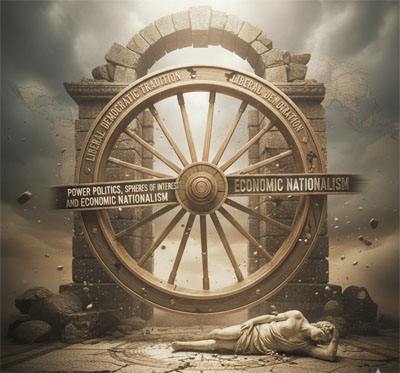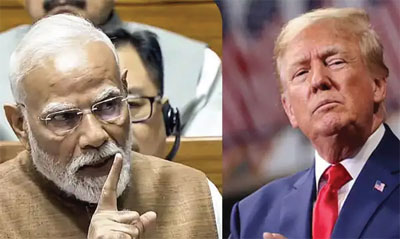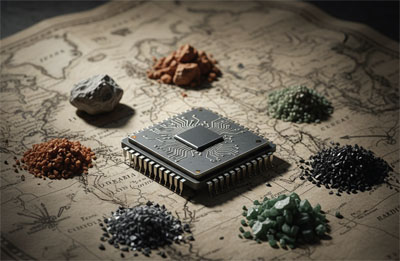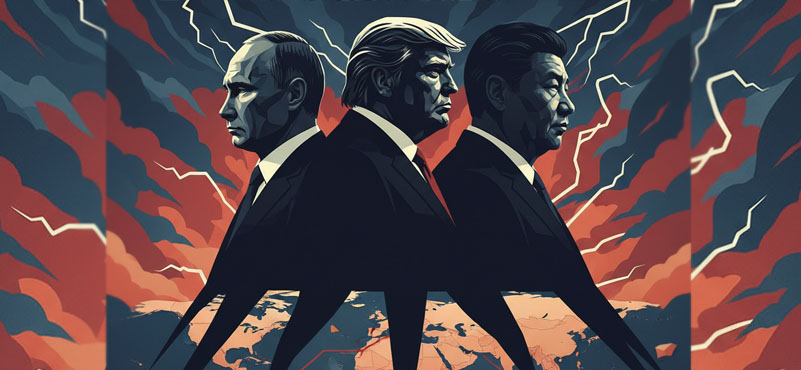Did the recent meeting between US President Donald Trump and China’s leader Xi Jingpin end with the two underlining the dawn of a new bipolar world order? The phrase dates back to the Cold War when America and the Soviet Union were the dominant forces in the word. Are we again entering a world dominated by a new set of nations run by strongmen?
 In an opinion piece in Time magazine (October 27), Richard Stengel, former editor and chief and Under Secretary of State for Public Diplomacy under President Barak Obama, writes: “Instead of moving forward, the wheel of history has turned back to the 19th Century world of strongmen and power politics, spheres of interest and economic nationalism.” We are seeing that now in the wake of Trump’s election, with nations and blocs scrambling to establish their own spheres of influence, while economic nationalism and anti-immigration policies sweep across the western world. What is also evident is Stengel’s posit that this is the age of strongmen. Europe is in the throes of political and economic strife, with no one leader dominant and able to marshal the bloc to counter the threats from Russia in Ukraine and eastern Europe, or even China’s economic clout. Look around. The countries that hold sway and can dictate their own terms in the emerging world disorder are what political scientists describe as Strongmen, dominant politicians and leaders whose power lies in the authority, even fear, they command.
In an opinion piece in Time magazine (October 27), Richard Stengel, former editor and chief and Under Secretary of State for Public Diplomacy under President Barak Obama, writes: “Instead of moving forward, the wheel of history has turned back to the 19th Century world of strongmen and power politics, spheres of interest and economic nationalism.” We are seeing that now in the wake of Trump’s election, with nations and blocs scrambling to establish their own spheres of influence, while economic nationalism and anti-immigration policies sweep across the western world. What is also evident is Stengel’s posit that this is the age of strongmen. Europe is in the throes of political and economic strife, with no one leader dominant and able to marshal the bloc to counter the threats from Russia in Ukraine and eastern Europe, or even China’s economic clout. Look around. The countries that hold sway and can dictate their own terms in the emerging world disorder are what political scientists describe as Strongmen, dominant politicians and leaders whose power lies in the authority, even fear, they command.
 Gideon Rachman, columnist and veteran journalist, published a book titled ‘The Age of the Strongman’. In it, he writes a series of well-informed essays about the global rise of nationalist-populist leaders and its impact on the liberal democratic tradition that had endured for now almost five decades. Rachman’s central thesis is that this is a modern phenomenon, roughly beginning with Vladimir Putin’s rise to national power in 1999-2000. He views Putin as “the archetype and model for the current generation of strongman leaders” who are generally using the central authority of the state to bolster their personal position. Putin’s fight into Ukraine, and therefore potentially taking on NATO, lasting the war as he has with all the economic sanctions against him, defying Trump again and again, has left his strongman image more or less intact. Rachman’s list of current strongmen who are dominating world affairs and economic influence includes China’s Xi Zingpin, Hungary’s Viktor Orbán, Israel’s Benjamin Netanyahu, Rodrigo Duterte of the Philippines, Nicaragua’s Daniel Ortega, Venezuela’s Nicolás Maduro and, towering above them all, Donald Trump who has turned America’s long-standing liberal democracy into his personal fiefdom, wreaking vengeance on his opponents and attacking minorities, migrants and the media.
Gideon Rachman, columnist and veteran journalist, published a book titled ‘The Age of the Strongman’. In it, he writes a series of well-informed essays about the global rise of nationalist-populist leaders and its impact on the liberal democratic tradition that had endured for now almost five decades. Rachman’s central thesis is that this is a modern phenomenon, roughly beginning with Vladimir Putin’s rise to national power in 1999-2000. He views Putin as “the archetype and model for the current generation of strongman leaders” who are generally using the central authority of the state to bolster their personal position. Putin’s fight into Ukraine, and therefore potentially taking on NATO, lasting the war as he has with all the economic sanctions against him, defying Trump again and again, has left his strongman image more or less intact. Rachman’s list of current strongmen who are dominating world affairs and economic influence includes China’s Xi Zingpin, Hungary’s Viktor Orbán, Israel’s Benjamin Netanyahu, Rodrigo Duterte of the Philippines, Nicaragua’s Daniel Ortega, Venezuela’s Nicolás Maduro and, towering above them all, Donald Trump who has turned America’s long-standing liberal democracy into his personal fiefdom, wreaking vengeance on his opponents and attacking minorities, migrants and the media.
America has had strong leaders before but not an autocratic strongman who wields power like a wrecking ball. Lincoln, Eisenhower, Roosevelt, even Reagan, were all dominant, popular figures but they stood by the Constitution and the rule of law.
 That, of course, begs the question whether countries led by so-called strongmen in today’s unpredictable world are incompatible with democracy. Trump disputed the election that gave Joe Biden the presidency but democracy won, albeit under tremendous pressure from Trump’s MSGA base that stormed the United States Capitol in violent protest. Strongmen have one weakness: they believe they are indestructible and therefore it is their destiny to rule a country as their birthright. We have seen this often enough in Latin America and Africa. Is this easier in weaker democracies?
That, of course, begs the question whether countries led by so-called strongmen in today’s unpredictable world are incompatible with democracy. Trump disputed the election that gave Joe Biden the presidency but democracy won, albeit under tremendous pressure from Trump’s MSGA base that stormed the United States Capitol in violent protest. Strongmen have one weakness: they believe they are indestructible and therefore it is their destiny to rule a country as their birthright. We have seen this often enough in Latin America and Africa. Is this easier in weaker democracies?
We also have the example of a Strongwoman, Indira Gandhi in India, who ruled with an iron hand and had a major say in global politics, thanks to her leadership of the Non-Aligned Movement. When her dominance over Indian politics was threatened by a Supreme Court decision, she imposed a brutal emergency. Her decision to call a snap election after 21 months of authoritarian rule and a crackdown on her political opponents was based on her delusion that the country was firmly behind her. It was a gamble that failed but it showed, at least in India, that democracy prevailed. That was in the mid-70s but times have changed and so has the dramatic rise of the strongman, this time in a deeply polarised world and also one where economic power has more prominence than political standing.
 The strongman paradox arises from confusion over the difference between absolute and authoritarian power and resilience. Absolute power is all about personal dominance, usually without regard for law or justice or the rights of others. Trump, for instance, has often talked about a ‘Third Term’, although the American Constitution forbids it.
The strongman paradox arises from confusion over the difference between absolute and authoritarian power and resilience. Absolute power is all about personal dominance, usually without regard for law or justice or the rights of others. Trump, for instance, has often talked about a ‘Third Term’, although the American Constitution forbids it.
Indian Prime Minister Narendra Modi is often described as a strongman, but his refusal to take on Trump in the latter’s repeated claims of brokering the recent India-Pakistan ceasefire, shows that while he may like to project a strongman image, he is also resilient in nature, mature in diplomacy and open to seeing the bigger picture. In today’s global political order, it helps to occupy a chair at the global high table, and leading a country that matters. Being described as a strongman may have its political benefits domestically and in the global pecking order but it also lays leaders open to the charge of undermining democratic traditions and systems. (Does size matter? Perhaps, it could be the defining criteria. In a nation of 1.4 billion people, democracy as in free spirit, if left unchecked, can lead to policy paralysis of its own – Editor)
The rise of the strongman has coincided with the massive role that economic heft has started to play in global politics. China’s control over rare earth materials is one prime example. National security always had an economic factor to it but almost overnight, it seems, the balance of power lies in semiconductor chips and secure access to rare minerals to build cars and batteries and to energy supplies that can be impervious to war and military conflict. That also means less dependence or display of a liberal, democratic world and prioritising national security over market freedom.
This concept is visible in virtually every nation right now, and it is recalibrating the relationship of states to markets, of politics to economics. At the end of the day, it means a major strategic shift, towards a position where nations determine economic policies that are geared to national or public interest. In that ruthless dog eat dog world, the ones who matter are the so-called Strongmen, the ones who, by force of will, backed by force of arms, will call the shots in the emerging new world order.
(How will this change once Trump completes his four-year term, with one year almost ending? Will we revert to just dictatorships and strongmen? Or, will new leaderships emerge where strongmen can play the game within respect of democratic traditions? Trade wars on items like semi-conductor chips and rare earths, unheard of items till a few years ago, have surfaced when weaponised, in an era when economic heft has led to tariff threats to trade wars, as evil as those on with traditional weapons – Editor).
ABOUT THE AUTHOR
 Dilip Bobb is a former senior managing editor, India Today (1975 -2010), and Group Editor, Features and Special Projects, Indian Express (February 2011-October 2014)
Dilip Bobb is a former senior managing editor, India Today (1975 -2010), and Group Editor, Features and Special Projects, Indian Express (February 2011-October 2014)








